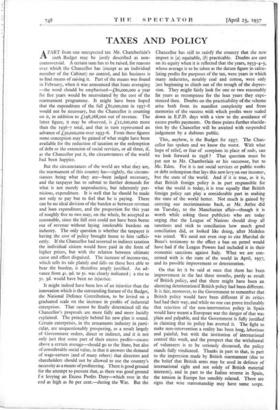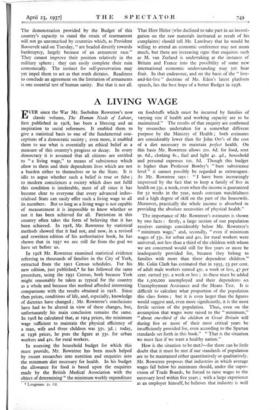TAXES AND POLICY
APART from one unexpected tax Mr. Chamberlain's sixth Budget may be justly described as non- controversial. A certain sum has to be raised, for reasons over which the Chancellor has (except as an individual member of the Cabinet) no control, and his business is to find means of raising it. Part of the means was found in February, when it was announced that loans averaging —the word should be emphasised—E8o,00o,00o a year for five years would be necessitated by the cost of the rearmament programme. It might have been hoped that the expenditure of the full £8o,000,000 in 1937-8 would not be necessary, but the Chancellor is counting on it, in addition to L198,268,000 out of revenue. The latter figure, it may be observed, is L12,200,000 more than the 1936-7 total, and that in turn represented an advance of £5o,00o,000 over 1935-6. From those figures some conception may be gained of what might have been available for the reduction of taxation or the redemption of debt or the extension of social services, or all three, if, as the Chancellor put it, the circumstances of the world had been happier.
But the circumstances of the world are what they are, the rearmament of this country has—rightly, the circum- stances being what they are—been judged necessary, and the taxpayer has to submit to further demands for what is not merely unproductive, but inherently per- nicious, expenditure. It is well that he should be made not only to pay but to feel that he is paying. There can be no ideal division of the burden as between revenue and loan expenditure, and the proportion for this year of roughly five to two may, on the whole, be accepted as reasonable, since the full cost could not have been borne out of revenue without laying intolerable burdens on industry. The only question is whether the taxpayer is having the cost of policy brought home to him suffici- ently. If the Chancellor had resorted to indirect taxation the individual citizen would have paid in the form of higher prices, but with the relation between ultimate cause and effect disguised. The increase of income-tax, which tells its tale plainly and falls on those best able to bear the burden, is therefore amply justified. An ad- vance from 4s. 9d. to 5s. was clearly indicated ; a rise to 5s. 3d. would have been no injustice.
It might indeed have been less of an injustice than the innovation which is the outstanding feature of the Budget, the National Defence Contribution, to be levied on a graduated scale on the increase in profits of industrial enterprises. That cannot be finally determined till the Chancellor's proposals are more fully and more lucidly explained. The principle behind his new plan is sound. Certain enterprises, in the armaments industry in parti- cular, are unquestionably prospering, as a result largely of Government orders, direct or indirect, and it is not only just that some part of their excess profits—excess above a certain average--should go to the State, but also of considerable social value, in that it answers the demand of wage-earners (and of many others) that directors and shareholders should not be allowed to use the country's necessity as a means of profiteering. There is good ground for the attempt to prevent that, as there was good ground fr levying an Excess Profits Duty—which rose in the end as high as 8o per cent.—during the War. But the Chancellor has still to satisfy the country that the new impost is (a) equitable, (b) practicable. Doubts are cast on its equity when it is reflected that the years, 1933-4-5, whose average is to be taken as the datum figure in calcu- lating profits for purposes of the tax, were years in which many industries, notably coal and cotton, were only just beginning to climb out of the trough of the depres- sion. They might fairly look for one or two reasonably fat years as recompense for the lean- years they expe- rienced then. Doubts on the practicability of the scheme arise both from its manifest complexity and from memories of the success with which profits were scaled down in E.P.D. days with a view to the avoidance of excess profits payments. On these points further elucida- tion by the Chancellor will be awaited with suspended judgement by a dubious public.
This, anyhow, is the Budget for 1937. The Chan- cellor has spoken and we know the worst. With what hope of relief, or fear of scorpions in place of rods, can we look forward to 1938 ? That question must be put not to Mr. Chamberlain or his successor, but to Mr. Eden. For it is not social services or public works or debt redemption that lays this new levy on our incomes, but the state of the world. And if it is true, as it is, that British foreign policy is in part responsible for what the world is today, it is true equally that British foreign policy can play a considerable part in making the state of the world better. Not much is gained by carrying our recriminations back, as Mr. Attlee did on Tuesday, to the Manchurian affair—though it is worth while asking those publicists who are today urging that the League of Nations should drop all sanctions and stick to conciliation how much good conciliation did, or looked like doing, after Mukden was seized. We need not even stop to cite Marshal de Bono's testimony to the effect a ban on petrol would have had if the League Powers had included it in their economic sanctions against Italy. What. we .are con- cerned with is the state of the world in April, 1937, and its possible improvement or deterioration.
On that let it be said at once that there has been improvement in the last three months, partly as result of British policy, and that there might have been an alarming deterioration if British policy had been different. It is fair, moreover, to the Government to remember that British policy would have been different if its critics had had their way, and while no one can prove irrefutably that rejection of the non-intervention policy in Spain would have meant a European war the danger of that was plain and palpable, and the Government is fully justified in claiming that its policy has averted it. The fight to make non-intervention a reality has been long, laborious and painful, but with the institution of international control this week, and the prospect that the withdrawal of volunteers is to be seriously discussed, the policy stands fully vindicated. Thanks in part to that, in part to the impression made by British rearmament (due to the belief that British arms may be used in defence of international right and not solely of British material interests), and in part to the Italian reverse in Spain, the tension in Europe has sensibly relaxed. There are signs that wise statesmanship may have some scope. The demonstration provided by the Budget of this country's capacity to stand the strain of rearmament will not go unremarked by countries which, as President Roosevelt said on Tuesday, " are headed directly towards bankruptcy, largely because of an armament race." They cannot improve their position relatively in the military sphere ; they can easily complete their ruin economically. The instinct for self-preservation may yet impel them to act as that truth dictates. Readiness to conclude an agreement on the limitation of armaments is one essential test of human sanity. But that is not all. That Herr Hitler (who declined to take part in an investi- gation on the raw materials instituted as result of his complaints) should tell Mr. Lansbury that he would be willing to attend an economic conference may not mean much, but there are increasing signs that enquiries such as M. van Zeeland is undertaking at the instance of Britain and France into the possibility of some new international economic understanding may yet bear fruit. In that endeavour, and on the basis of the " live- and-let-live " doctrine of Mr. Eden's latest platform speech, lies the best hope of a better Budget in 1938.











































 Previous page
Previous page